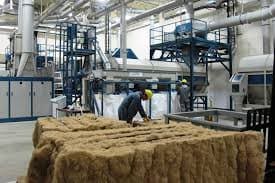Hemp is versatile.
The plant can be used to make cat litter, shopping bags, skin cream, paper and cardboard, diapers, shoes, concrete, garden amendments, jeans and bioplastic.
Companies and entrepreneurs could convert hemp into a longer list of consumer goods, but one piece of the puzzle is often missing: processing.
“All of those industries … they want hemp, but they need it to be useful. It needs to be re-producable. It needs to go into an engineered product, a high-valued product. You can’t have some pieces being a 1/16th of an inch and some being a foot long,” said Stephen Christensen, vice-president and general manager of Canadian Greenfield Technologies, a Calgary company that specializes in hemp processing technology.
“There’s a lot it can be made in to, but you have to process it. Nobody is just buying (hemp) straw for (a) final product.”
Canadian Greenfield Technologies wants to fill the processing void. It has developed a unique processing plant, called HempTrain, that converts bales of hemp straw into something that’s usable.
“When dry feedstock is processed, hemp is separated into long, strong bast fibre, clean, size-specified hard (short fibres in the core of the stem) and a nutrient-rich green microfibre,” the company’s website says.
Canadian Greenfield’s main business is selling HempTrain technology to companies that want to make products such as cat litter and diapers from hemp.
However, this summer it’s offering another service — toll processing.
“The availability of this service will allow hemp farmers to bridge the processing gap towards high value markets and give them the opportunity to generate considerable additional revenue,” Canadian Greenfield said in a June news release.
There must be significant demand for hemp processing in Western Canada because the company plans to open a second toll processing facility, in Calgary, this fall.
“We just announced that we’re doing this and we’re already basically at capacity for this location,” Christensen said.
“And (we’re) making a list for October.”
Canadian Greenfield is mostly working with Canadian firms that have a commercial hemp product and would like to buy a HempTrain processing plant. A HempTrain plant costs $1.94 million, a company rep said.
But many of those firms don’t have sufficient sales to justify the purchase. Toll processing allows a company to get its product (maybe hemp jeans) to market and build up sales so it can make the next step and buy its own HempTrain plant.
Christensen didn’t share how many HempTrain units have been sold. A few firms are setting up plants and “multiple, multiple groups” have expressed interest, he said.
If a number of processing plants are built across Canada, it could fulfill a long-term goal of the hemp industry — whole plant utilization.
For most of the last 20 years, Canada’s hemp trade has been founded on hemp grain and using the grain to produce food. There’s been plenty of talk about selling the remainder of the plant, but not a lot of action.
As a result, a huge volume of hemp straw has gone to waste. Farmers baled up the straw, hoping to find a market for it, but there were no buyers.
“There’s always a hope … it (the straw) will be also profitable,” Christensen said.
“But it never comes to fruition and therefore … after they have (the bales) there for quite some time, they eventually burn them.”
Many of the hemp bales stored on farm, even old ones, are still usable because hemp is anti-bacterial.
If the hemp bale is large, the inner part of the bale can be processed into bast fibre or hurd fibre many years after it was harvested.
“We can make fantastic product out of stuff that’s been sitting on the field for eight years,” Christensen said.
“You’ll see retting on the outside, but it won’t (happen) internally…. It looks like garbage out in the field, but crack one of those bales open and you’ll see it’s amazing.”

